|
|
|
Sort Order |
|
|
|
Items / Page
|
|
|
|
|
|
|
| Srl | Item |
| 1 |
ID:
163061
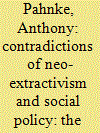

|
|
|
|
|
| Summary/Abstract |
This article explores how contradictory development tendencies within Brazil’s primary sector have contributed to the country’s enduring political crisis. I show that President Rousseff, when dealing with declining royalty payments from natural resource exports and a decrease in tax revenue from imports, financed social policies in ways that her opponents branded as unconstitutional to remove her from power. After documenting the central players within the political crisis, namely those who have been under investigation in Operação Lava Jato (Operation Car Wash), I illustrate how the ongoing corruption scandals plaguing Brazil have their roots in the country’s raw material export industries.
|
|
|
|
|
|
|
|
|
|
|
|
|
|
|
|
| 2 |
ID:
163228


|
|
|
|
|
| Summary/Abstract |
Oil has seriously impacted the institutional development of the state in the Arabian Peninsula. More specifically, the sudden and unprecedented acquisition of massive oil revenues resulted in the freezing of the state’s formal and informal institutions, at the point at which petrodollars were injected into the state’s coffers. From then on, state leaders were able to deploy the state’s wealth to dictate the pace and direction of institutional change. Over time, any institutional change has been directed towards enhancing regime security, and the pace of change has been calculated and deliberately slow. Any political opening has been dictated by the logic of state power maximization (in relation to society). At the same time, partly to ensure its popular legitimacy and partly through the vision of its leaders, the state has deployed its massive wealth both to foster rapid economic and infrastructural development, and to enhance the living standards of its citizens. In other words, whereas oil may have stunted institutional development –– i.e., an institution’s curse –– it has been an economic blessing.
|
|
|
|
|
|
|
|
|
|
|
|
|
|
|
|
| 3 |
ID:
174368
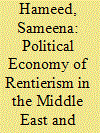

|
|
|
|
|
| Summary/Abstract |
Rentierism in the Middle East and North Africa (MENA) region had emanated both from significant external rent and from the statist model of development feeding each other, where legitimacy was secured through rent distribution. The rent-led resource imbalance between the state and the society, as well as intra-societal inequalities in the region, has been less recognized and studied. The flow of external rent in tandem with internal rent-seeking has perpetuated the wealth and power of the political and economic elites and limited economic opportunities of the larger population. The rentierism that bred on vertical controls and network of privileges is set to be disrupted from flows and connectivity generated in the growth of digital commerce in the region.
|
|
|
|
|
|
|
|
|
|
|
|
|
|
|
|
| 4 |
ID:
154660
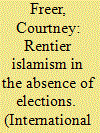

|
|
|
|
|
| Summary/Abstract |
Drawing on contemporary history and empirical research, this article revises traditional rentier state theory, which fails to account for the existence of Islamist movements in states accruing substantial outside wealth. Rentier state theory expects that citizens of such states will form opposition blocs only when their stake in rent income is threatened. Examining the development of Muslim Brotherhood affiliates in two archetypal rentier states, or super-rentiers, in the Gulf—Qatar and the United Arab Emirates—this article shows that ideology rather than rent motivated the formation of independent Islamist movements. This research helps to break the causal link established by rentier state theory between oil rents and lack of politically relevant Islamist organizations. We find that the presence of oil rents, instead of rendering Islamist complaint politically irrelevant, shapes the ways in which Islamist movements seek to influence government policies.
|
|
|
|
|
|
|
|
|
|
|
|
|
|
|
|
| 5 |
ID:
098707
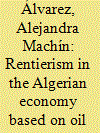

|
|
|
|
|
| Publication |
2010.
|
| Summary/Abstract |
This essay analyzes Algeria's degree of adaptation toward possessing the constituent features of an oil and gas rentier economy, and whether its current status could be threatened by changes to its energy policy. With this aim, the article first uses empirical evidence to analyze different rentier features of the Algerian economy (the importance of the hydrocarbon sector, Algerian NOC Sonatrach's role in energy policy and revenue distribution). Second, the circuit that perpetuates rentier logic is described, the main conclusion being that the Algerian economy does indeed offer the very conditions that guarantee the self-perpetuation of rentierism. However, this conclusion is jeopardized by uncertainties stemming from two potential changes in the national status of the hydrocarbons sector: a greater presence of foreign hydrocarbon companies in Algeria, and growing internationalization by Sonatrach.
|
|
|
|
|
|
|
|
|
|
|
|
|
|
|
|
| 6 |
ID:
125826
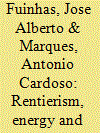

|
|
|
|
|
| Publication |
2013.
|
| Summary/Abstract |
The Algerian economy is an example of a high level of rentierism, while the Egyptian economy shows a low/moderate level of rentierism. The ARDL bounds test approach was used upon annual time series data from 1965 to 2010. The results suggest cointegration for both countries. Bi-causality between energy consumption and growth in the long run was found. For Algeria there is a reversed (negative) energy-growth nexus, adding a new relationship to the traditional four causal hypotheses on the energy-growth nexus. For Egypt, we found positive elasticity both of oil price and energy, which is in line with the mainstream.
|
|
|
|
|
|
|
|
|
|
|
|
|
|
|
|
| 7 |
ID:
163233
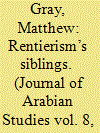

|
|
|
|
|
| Summary/Abstract |
his paper examines rentier state theory (RST), and specifically “rentierism” as a more refined and nuanced variant of RST, arguing that while rentierism provides considerable utility in explaining the state-society relationships of the contemporary Arab states of the Persian Gulf, it is insufficient as a stand-alone explanation, and needs to be considered as a political dynamic of the state-society relationship, rather than as a structural explanation for the state itself, as early RST more ambitiously sought to do. Rentierism therefore needs to be utilized in combination with two other explanatory frameworks, neopatrimonialism and state capitalism. In effect, these are rentierism’s theoretical “siblings”: they sharpen a rentier analysis by providing greater nuance about how elite networks, business-government relations, and personalized politics operate and interact in the allocative settings of the Gulf, as well as illustrating both the scope and the limits of rentierism as an explanatory framework.
|
|
|
|
|
|
|
|
|
|
|
|
|
|
|
|
| 8 |
ID:
177205


|
|
|
|
|
| Summary/Abstract |
This introduction outlines how the fragmentation of the Middle East state system, coupled with the shifts in the centrality of oil to the well-being of the Global economy, has now recast debates about the very nature of energy security and the future stability of the Gulf monarchies. Acting as a primer to the articles that comprise this special section of Journal of Arabia Studies, it highlights many of the attendant security issues surrounding energy diversification strategies now being adopted by many of the regions actors, while also highlighting the key differences that have shaped the responses of the individual Gulf monarchies to the challenges they now face in an ever more uncertain era.
|
|
|
|
|
|
|
|
|
|
|
|
|
|
|
|
|
|
|
|
|